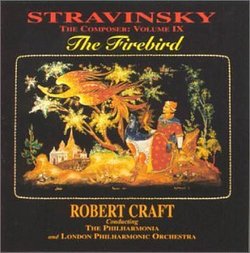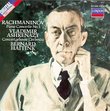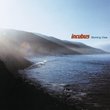| All Artists: Stravinsky, Robert Craft Title: Igor Stravinsky: The Firebird (The Composer, Vol. IX) Members Wishing: 0 Total Copies: 0 Label: Music Masters Classics Release Date: 5/20/1997 Genre: Classical Styles: Ballets & Dances, Ballets, Chamber Music, Forms & Genres, Concertos, Theatrical, Incidental & Program Music, Historical Periods, Modern, 20th, & 21st Century, Symphonies Number of Discs: 1 SwapaCD Credits: 1 UPC: 016126717722 |
Search - Stravinsky, Robert Craft :: Igor Stravinsky: The Firebird (The Composer, Vol. IX)
 | Stravinsky, Robert Craft Igor Stravinsky: The Firebird (The Composer, Vol. IX) Genre: Classical
|
Larger Image |
CD DetailsSimilarly Requested CDs
|
CD ReviewsMarvelous Karl Henning | Boston, MA | 04/05/2004 (5 out of 5 stars) "This entire disc is a pleasure to listen to, though admirers of the Firebird should be warned that the Variations in memoriam Aldous Huxley (the latest work on the disc) are stylistically a wide leap from the Dukas-flavored Feux d'artifice (the earliest). Everything is competently and musically presented; and the stylistic variety only underscores the tour-de-force. The Concerto in D for strings, particularly, used to be one of the odd works in the Stravinsky catalogue which left me inexplicably cold; Craft's recording here brought the piece to life for me.I've always love the complete Firebird, I've never understood how the concert world could for so long have insisted on presenting this work only in its abbreviated Suite (though, to be fair, the Suite is for a slightly smaller orchestra; not many community orchestras, for example, can trot out two contrabassoons and three harps). Much of the ballet which did not "make the cut" of the Suite, is of a more Romantic vein more readily linked to Stravinsky's teacher, Rimsky-Korsakov; the whole work is nonetheless completely Stravinsky -- indeed, the work is much more closely motivic and 'cellular' than Rimsky-Korsakov, which is apparent on hearing the ballet in its entirety. This, apart from the plain logic that the complete ballet has an entire dramatic sequence which sets up the vigorous Danse infernale, which, separated from that context, comes out of nowhere in the Suite. Craft does a great job with the whole work; there was a time when I had never suspected Craft to be capable of making such a sumptuous sound with the Firebird.The brief Canon, on the Russian folk tune quoted in the finale of the Firebird, is written in a bright brassy mode which recalls the Symphony in Three Movements. It makes a colorful little "encore" to follow the ballet. This is a fabulous disc.Having a new Ur-text ought theoretically to mean, all the corrections have already been baked in. But this is a rich score, and while the Suites have gotten lots of play over the years, perhaps the full ballet has been a little unfairly insulated from the need for rapid correction, through its comparative (and undeserved) neglect for so long. The Craft recording here is therefore not only (and, naturally, most importantly) a glowing rendition of a shimmering score; but his liner notes are informative, detailed, and include a list of selected errata for the new Ur-text. Some of these are cosmetic, Augenmusik matters (the relative placement of the piano and harp on page 31, e.g.), but largely these are entirely useful pointers: the Ur-text neglects to mark the trumpets "con sordino" (muted) for their first entrance in measure 8, e.g..One question I have, which may not have made Craft's necessarily incomplete errata list, since it is, simply, something one hears perfectly clearly (as opposed to subtleties such as the six bars to be struck from the violas on a certain page, for which the guidance is crucial) ... in the Finale, at the end of measures 1282 & 1284 (that is, the partial-measures immediately before rehearsal marks 207 & 208), there are aggressive crescendi driven by the timpani ... an exciting effect, but it isn't in the score, and I should be curious where it comes from in the sources.Craft writes of restoring to the Finale (indeed, claims that this is the first recording to include this) two on-stage trumpets which play a sustained perfect fifth against the rhythmically-punched-out tune (the passage which, in retrospect, Aaron Copland spent so much effort imitating) for the few measures when it is in C major. My slightly mischievous quibble here is, that actually there are three on-stage trumpets, though (to be fair) not in the specific bars Craft referred to. But the score does have the three playing octave (concert) B's against the immense chorale in the rest of the brass at the close; and the three on-stage trumpets also figure in the chirpy tritones of Daybreak.All this is really in gratitude to Craft, for this marvelous recording of his has really been the occasion to get this wonderful score much better.One instance in which I take respectful but firm exception to Craft is, I entirely disagree that the music of the Firebird's supplication (begging Ivan Tserevich to release her) is at all "too long"; I think this comment is a sort of aesthetic retrofit. In the light of Stravinsky's subsequent career, his ballets tended to be more focused, "leaner"; but this does not imply that the more relaxed, expansive time-frame reflected in the Firebird is perforce "flabby" - not at all."
|

 Track Listings (32) - Disc #1
Track Listings (32) - Disc #1

